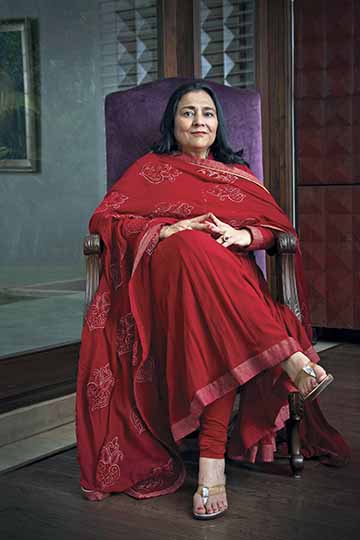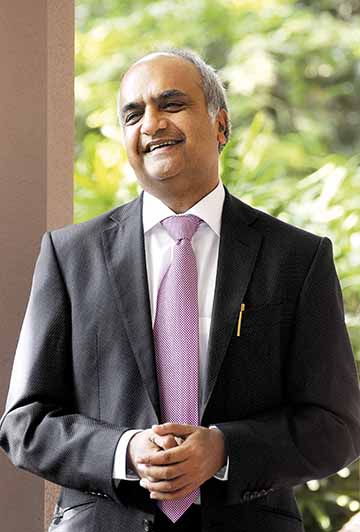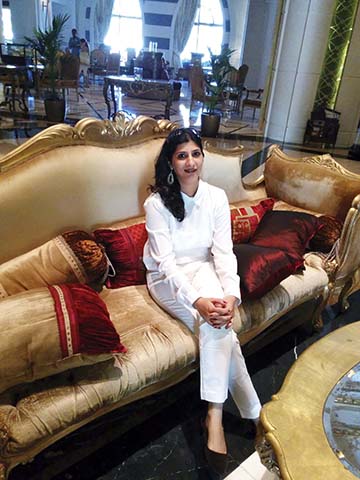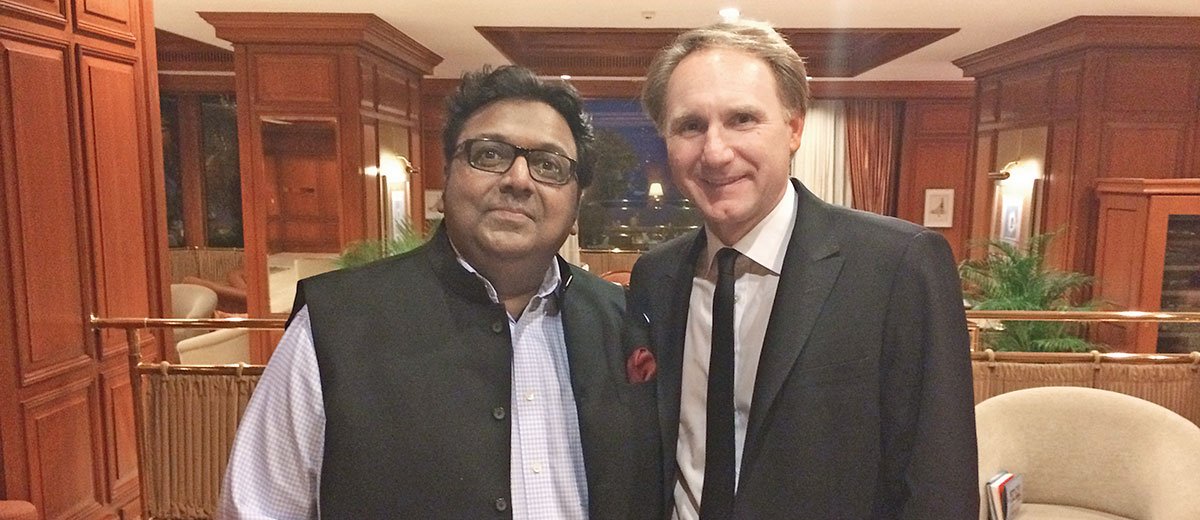
Poetry and Poise
Poetry and Poise
Many years of writing come together in Laxmana Dalmia’s new book One Soul Many Lives, which is due for launch on April 6. MARWAR talks to the spirited lady about her book, her outlook towards life and lots more.
Text: Benaifer J Mirza
 with my experience, I would like to tell people, ‘Always open your heart, every time it shuts down… and always play life’s game bigger and better.’ Because they can!” says Laxmana Dalmia, the lady of many talents. Film-maker, theatre activist, writer, humanitarian, wellness mentor, tarot card reader—she’s all this and lots more, all rolled into one.
with my experience, I would like to tell people, ‘Always open your heart, every time it shuts down… and always play life’s game bigger and better.’ Because they can!” says Laxmana Dalmia, the lady of many talents. Film-maker, theatre activist, writer, humanitarian, wellness mentor, tarot card reader—she’s all this and lots more, all rolled into one.
“If history were to chronicle my path, it would certainly highlight the fact that no matter what my circumstances were, I did rise above them to achieve success and brilliance, and that there is still a ‘sprint’
in my stride as I cross the next hurdle!” she continues.
Here’s delving deeper into the life of the multifaceted lady.
Tell us a little about yourself.
Though born and bred in Delhi, I have a close association with Rajasthan. It is the native state of my parents. My father, Ram Krishna Dalmia, was from Chirawa. The identity of this town is because of its relation with the Birlas, Dalmias, Goenkas and Kanodias.
My mother, Dinesh Nandini Dalmia, belonged to an erudite family in Udaipur and was known for her bold stance on women’s education. She broke the purdah system and was the first woman in the state to do her MA. I studied at Mater Dei Convent School in Delhi and later did my Master’s in Philosophy from Lady Shri Ram College. My mother had set high standards of education for us. She had always directed our governesses in detail on what she expected.
Whenever she broke out of her self-imposed social and domestic exile, she would sit with us and impart some pearls of wisdom. “The world is your oyster,” she would say, “learn as much as you can from it, and when the time comes, go out and give to all what the universe has given to you.”
I was brought up in an atmosphere fraught with fear and superstition—of dichotomous and paradoxical values. Even though I had been taught early on by my mother to rise above farcical traditions, in my adult years, I was forced to submit to them by an austere, patriarchal system. As a child, and even as an adult, I was torn between family loyalties and the desire for freedom and a yearning for a better life.
What are your earliest memories of books, writing and art in general?
 My earliest memory, as a nine-year-old, is of my maternal grandfather, who was a professor of English at Nagpur University. Whenever he was in town, he would make me read aloud from all kinds of books, to correct my diction, content and style. He would give me imaginative topics and a single emotion—for example ‘anger’—and ask me to write and draw a sketch of what I felt when I heard that word. That developed my reading and writing skills, my creativity and first interest in art and its relationship with the written word.
My earliest memory, as a nine-year-old, is of my maternal grandfather, who was a professor of English at Nagpur University. Whenever he was in town, he would make me read aloud from all kinds of books, to correct my diction, content and style. He would give me imaginative topics and a single emotion—for example ‘anger’—and ask me to write and draw a sketch of what I felt when I heard that word. That developed my reading and writing skills, my creativity and first interest in art and its relationship with the written word.
I still remember, with pride, the day my grandfather patted me on the head for my piece on ‘the difference between good and evil,’ and said, “One day you will make your mark as a writer of great depth and insight.”
When I was 13, my writing skills were indirectly honed by my mother—a legend in Hindi literature and an extraordinary and extremely gifted writer, with more than 35 published books. Her poetry and novels had the mystical quality that made other littérateurs compare her with Wordsworth. She would make me read aloud, edit and rewrite what she had written. That gave me the confidence I needed and the burning ambition to one day become as famous as her.
What inspired you to write One Soul Many Lives?
One Soul Many Lives is the result of many years of writing. The poetry runs through an entire gamut of emotions, ranging from fear, insecurity, frustration, jealousy, hatred and anger, to love, comprehension, compassion, balance and then finally spirituality. In a way, the emotions expressed follow the pattern of my life.
I had written so much that friends and family pointed out that there was a book here. They urged me to compile and organise it all. One Soul Many Lives is that outcome.
My first poem, ‘Feet of Clay’, was written for my father, at the age of 13, as a result of the disillusionment
I experienced with him, when I realised that the man I
had idealised was a mere mortal beneath a mould that I had created.
You’re involved in a number of creative areas. What’s closest to your heart?
Every field I’ve been in and am associated with continues to be close to my heart. In each, the focus has been mainly women and children; and all these mediums that I have chosen are strong carriers of how I want to help. I have been nurturing a dream and working towards the creation of a structure for women and children, where all kinds of ‘guidance’ are available under one roof, through different mind-body-soul disciplines/sciences needed to help holistic healing, so that they can become stress-free and realise their full potential.
However, today, the area closest to my heart is where I can help people achieve their best. With my background as a philosophy major, tarot card reader, Theta healer and Neuro-Linguistic Programming (NLP) practitioner, it gives me a lot of satisfaction to facilitate people to discover their unique life path, anchor their distinctive strengths and understand and chart their own blueprint for success.
What motivated you to tap the generally untapped area of wellness mentoring?
 Destiny played a big hand in motivating me to walk this road. I was standing at a crossroads, without knowing which way to go. This crossroads was more difficult than the others. It was important to choose well, because my decision was going to impact a lot of lives. That is when I stumbled onto tarot. A Spanish gypsy initiated me into this amazing discipline and presented me with my first cards. Curiosity, my tarot readings for myself and an internal churning led me to dig deeper. Steered by my own quest for a spiritual fulfilment, I realised that I could help people bring transformation at a very deep level, by initiating a balance between the mind, body and soul.
Destiny played a big hand in motivating me to walk this road. I was standing at a crossroads, without knowing which way to go. This crossroads was more difficult than the others. It was important to choose well, because my decision was going to impact a lot of lives. That is when I stumbled onto tarot. A Spanish gypsy initiated me into this amazing discipline and presented me with my first cards. Curiosity, my tarot readings for myself and an internal churning led me to dig deeper. Steered by my own quest for a spiritual fulfilment, I realised that I could help people bring transformation at a very deep level, by initiating a balance between the mind, body and soul.
My meditation showed me the Akashic Records, and as I studied this deeper, I was introduced to the concept of relating the past to the present life. I learnt that we are all reservoirs of vast potential for success and happiness, which often remains untapped and unexplored. If we know how to tap into that reservoir, we can do and attain anything our heart desires. This concept fascinates me and I teach it to people even as I learn more and more.
Who is your greatest inspiration?
In the earlier years, when my father was a demigod to me, I was inspired to become a business magnate like him, and the author, Ayn Rand—with her books, Fountainhead and Atlas Shrugged, which were my bible. Her philosophy, ‘To live, man must hold three things as the ruling values of his life: Reason—Purpose—Self-esteem,’ resonated with my aspirations.
Greatly influenced by my mother, I discovered later that I was more an emotional being, not made for the cut-throat world of business, and that Rand’s philosophy was only a utopian concept.
Life was a constant struggle as I tried to blend reason and emotion. Unanswered questions, self-doubt and a search for my life-path led me into the esoteric world, where I believe, I have found my true métier. Today, any story, which depicts how a person can fight against incredible odds to find their place in the world, inspires me.
What next?
I’m currently working on a mythological play that is like an eye-opener for the women of today. My memoirs are almost ready for publication. I’m also working on a series of
self-help books for children, which will give
them insight and tips on how to deal with negative emotions.










